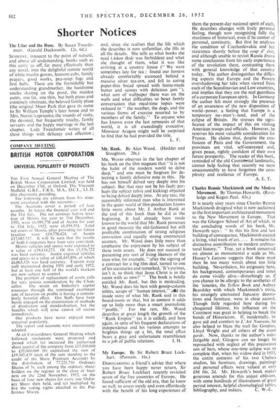Shorter Notices
The Lilac and the Rose. By Susan Tweeds- muir. (Gerald Duckworth. 12s. 6d.) SENSITIVE, innocent to the point of naiveté, and above all undemanding, books such as this carry us off, far more effectively than any novel, into the delightful remote world • of white muslin gowns, hansom cabs, family prayers, good works, pea-soup fogs and first balls. There are the formidable but understanding grandmother, the handsome uncles skating on the pond, the maiden aunts, one fat, one thin, but both pious and extremely obstinate, the beloved family place (the original Moor Park that gave its name to Sir William Temple's later house and to Mrs. Norris's apricots), the rounds of visits, the devoted, but frequently touchy, family servants and the happy marriage in the last chapter. Lady Tweedsmuir writes of all these things with delicacy and affection ; and, since she realises that the life which she describes is now unfamiliar, she fills in all the details. She tells us what books she read (Adam Bede was forbidden) and what she thought of them, what it was like arriving at a country house (" We were sometimes late for tea ; found our hostess already comfortably esconced behind a massive silver tea-urn, and fell to eating paper-thin bread spread with home-made butter and scones with delicious jam "), what sort of wallpaper there was on the walls and what difficulties so beset family conversation that • meal-time topics were reduced to " the weather, the dogs, and the various forms of exercise resorted to by members of the family." To anyone who has known even the last remnants of that world, it is all exceedingly evocative. Monsieur Aragon might well be surprised to find that he had provided the title.
L. F.


























 Previous page
Previous page